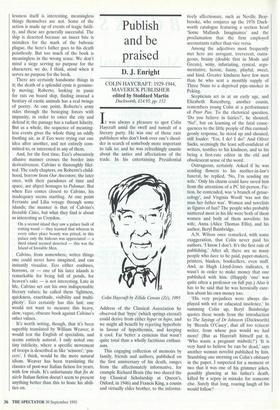Publish and be praised
D. J. Enright
COLIN HAYCRAFT: 1929-1944, MAVERICK PUBLISHER edited by Stoddard Martin Duckworth, L14.95, pp. 152 It was always a pleasure to spot Colin Haycraft amid the swell and tumult of a literary party. He was one of those rare publishers who don't look over one's shoul- der in search of somebody more important to talk to; and he was refreshingly caustic about the antics and affectations of the trade. In his entertaining Presidential Colin Haycraft by Zelide Cowan (Ze), 1995 Address of the Classical Association he observed that 'hype' (which springs eternal) could derive from either hyper or hypo, and we might all benefit by rejecting hyperbole in favour of hypothermia, and keeping it cool. Far better a cynicism that wasn't quite total than a wholly factitious enthusi- asm.
This engaging collection of memoirs by family, friends and authors, published on the first anniversary of his death, ranges from the affectionately informative, for example Richard Brain (the two shared the top Classical Scholarship at Queen's, Oxford, in 1946) and Francis King, a cousin and virtually elder brother, to the informa- tively affectionate, such as Neville Bray- brooke, who conjures up the 1976 Duck- worth catalogue featuring a section head `Some Mallards Imaginaires' and the proclamation that the firm employed accountants rather than vice versa.
Among the adjectives most frequently met here are arrogant, irreverent, outra- geous, brainy (double first in Mods and Greats), witty, infuriating, cynical, argu- mentative, heroic, funny, playful, sweet, and kind. Greater kindness have few men than he who sent a monthly supply of Three Nuns to a deprived pipe-smoker in Peking.
Scepticism set in at an early age, and Elizabeth Rosenberg, another cousin, remembers young Colin at a performance of Peter Pan. To the rhetorical question, 'Do you believe in fairies?', he shouted, `No!', but on learning of the fatal conse- quences to the little people of this curmud- geonly response, he stood up and shouted, still louder: 'Yes, I do! I do!' And Oliver Sacks, seemingly the least self-confident of writers, testifies to his kindness, and to his being a first-rate editor in the old and obsolescent sense of the word.
Outrageous, certainly. Asked if he was sending flowers to his mother-in-law's funeral, he replied, 'No, I'm sending my wife.' Only his charm could have saved him from the attentions of a PC hit-person. Fic- tion, he contended, was 'a branch of gynae- cology', and Virginia Woolf 'was not the man her father was'. Women and novelists as figures of fun? The people who probably mattered most in his life were both of them women and both of them novelists: his wife, Anna (Alice Thomas Ellis), and his author, Beryl Bainbridge.
A.N. Wilson once remarked, with some exaggeration, that Colin never paid his authors. 'I know I don't. It's the first rule of publishing.' After all, there are so many people who have to be paid, paper-makers, printers, binders, booksellers, even staff. And, as Hugh Lloyd-Jones indicates, it wasn't in order to make money that one published with him. (Happily 'one' was quite often a professor on full pay.) Also it has to be said that he was heroically care- less about his own money too.
`His very prejudices were always dis- played with wit or educated insolence.' In summing Colin up, Beryl Bainbridge quotes these words from the introduction to The Sayings of Dr Johnson (Duckworth) by 'Brenda O'Casey', that all too reticent writer, from whose pen would we had more! (But as Haycraft himself put it, `Who wants a pregnant midwife?') 'It is very hard to believe he can be dead,' says another woman novelist published by him. Stumbling one morning on Colin's obituary in the paper, I suspected for a moment or two that it was one of his grimmer jokes, possibly glancing at his father's death, killed by a sepoy in mistake for someone else. Surely that long, roaring laugh of his would follow?


































































 Previous page
Previous page